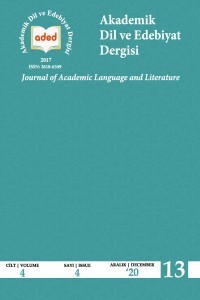
Akademik Dil ve Edebiyat Dergisi
Yazarlar: ["Fatma ÖZKAN KURT"]
Konular:-
DOI:10.34083/akaded.1204093
Anahtar Kelimeler:Duyusal dil,Koku,Eylem,Sözdizimsel,Anlambilimsel,Sensory linguistics,Olfactory,Verb,Syntactic,Semantic
Özet: Human feel the need to talk about perceptual content throughout his life. It also uses language to verbally express the perception it performs through sensory modal. For this reason, languages have different forms of speech related to sensory language. In some languages, morphemes are marked to express the sensory language, while in some languages this remains only at the lexical level. Some languages have a single lexical unit describing a sensory channel, while some languages have a lexical unit for each sensory modal. This diversity in talking about sensory content is increasing interest in sensory language studies. In this study, an answer is sought to the question of how the olfactory domain is expressed lexically in Turkish. It focuses on verbs from lexical categories to reveal the way Turks talk about smell. The data to be analyzed was obtained from the Turkish Dictionary (2011). These data are limited to abstract olfactory verbs expressing physical sensations. The detected verbs were evaluated in terms of their syntactic and semantic relations. According to this evaluation, 11 abstract verbs are expressing the olfactory domain in Turkish. At the center is to smell. Other verbs are extended verbs from to smell. Then, the morphological processes of the verbs were determined, and it was determined that these processes affected the syntactic and semantic relations of the verbs in question. It is among the findings that these processes also clearly affect the hedonic value of the perceiver in verbs.